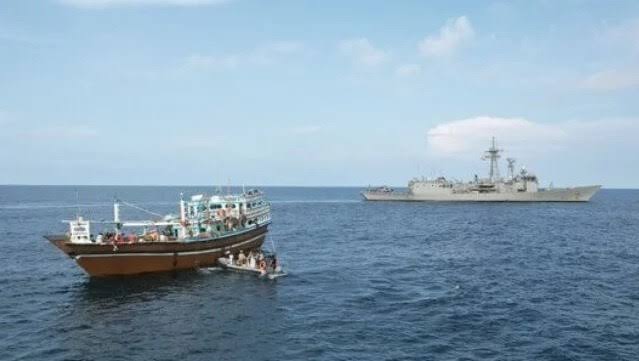Facebook Twitter (X) Instagram Somali Magazine - People's Magazine
The European Union Naval Force (EU NAVFOR) Operation Atalanta continues round-the-clock surveillance of a Chinese fishing vessel suspected to have been hijacked off the coast of Somalia. This development marks yet another challenge in the ongoing battle against maritime threats in the western Indian Ocean and the adjacent Gulf of Aden.
The Incident: Hijacking Alert
The Chinese fishing vessel, whose name has not been disclosed, was flagged as a potential hijacking victim on 5 December 2024. The alert came from the Puntland Maritime Police Force, a regional authority tasked with combating piracy and safeguarding maritime security.
Operation Atalanta, which has been operational since 2009, immediately deployed resources to monitor the vessel. The operation has been instrumental in addressing maritime piracy and ensuring the safety of shipping lanes in the region, particularly around Somalia, a known piracy hotspot.
Atalanta’s Assets in Action
The flagship of Operation Atalanta, the Spanish Navy’s ESPS Santa Maria (F81), has been at the forefront of this mission. Equipped with advanced surveillance technologies, the Santa Maria has utilized a Scan Eagle unmanned aerial vehicle (UAV) and an onboard Augusta-Bell AB-212 helicopter to maintain continuous visual and electronic surveillance of the vessel.
EU NAVFOR has also coordinated with Chinese and Somali authorities and the European Union delegation in Somalia to address the situation. This collaborative effort underscores the importance of international cooperation in ensuring maritime security.
Maritime Security Challenges in the Region
The waters off Somalia and the adjacent Red Sea have long been plagued by piracy and other maritime threats. While incidents have decreased in recent years due to concerted international efforts, the region remains vulnerable.
In November 2024, Operation Atalanta warned of a “moderate” threat level for shipping in its area of operations. This alert was issued as intelligence suggested a potential resurgence of pirate activity in the Somali Basin and the eastern Gulf of Aden.
The suspected hijacking serves as a stark reminder of the ongoing risks faced by vessels navigating these waters, particularly fishing boats, which are often targeted due to their lower levels of security compared to larger commercial vessels.
Operation Atalanta: A Decade of Vigilance
Operation Atalanta is the longest-serving EU naval mission in African waters. Since its inception in 2009, the operation has played a crucial role in deterring piracy, protecting vessels delivering humanitarian aid, and ensuring the free flow of trade.
It operates alongside two other EU missions: Operation Irini in the Mediterranean Sea and Operation Aspides in the Red Sea. Together, these missions demonstrate the EU’s commitment to maritime security and stability across critical global shipping lanes.
Calls for Vigilance and Collaboration
As the surveillance of the Chinese vessel continues, Operation Atalanta has reiterated its call for heightened vigilance among maritime operators in the region. Ship captains and crews are urged to adhere to best practices, including maintaining communication with naval forces and implementing onboard security measures.
The operation also highlights the need for stronger collaboration between regional authorities, international organizations, and private stakeholders to combat maritime threats effectively.
Impact on Global Trade and Security
The waters surrounding Somalia are vital for global trade, connecting major shipping routes between Europe, Asia, and Africa. Any escalation in piracy or maritime crime can disrupt these routes, causing economic losses and threatening international security.
Incidents like the suspected hijacking underscore the importance of sustained international efforts to address the root causes of maritime insecurity, including poverty, weak governance, and lack of economic opportunities in coastal regions.
Conclusion
The ongoing surveillance of the suspected hijacked fishing vessel by Operation Atalanta demonstrates the EU’s commitment to maritime security in the western Indian Ocean. While challenges persist, the proactive response from international naval forces and regional authorities provides hope for safer seas and continued trade flow.

